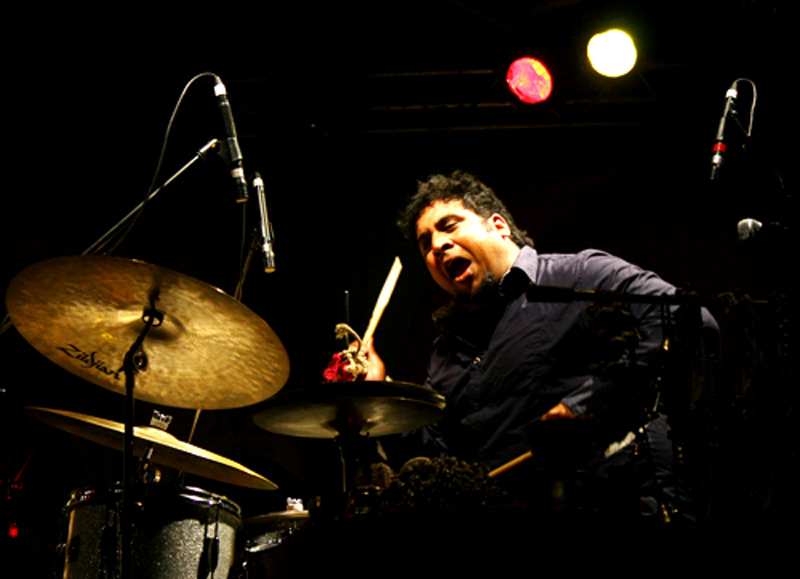The corporate sponsorship buck plays a huge role in the South African arts sector. Think the First National Bank Joburg Art Fair, the Standard Bank Joy of Jazz, the MTN South African Music Awards and the Design Indaba.
It is clear that South Africa’s corporates pour a lot of funding into the arts, but this corporate sponsorship can become a double-edged sword.
Take Swaziland’s premier music festival, Bushfire.

Storming sets from the BLK JKS (Borrie le Grange)
The fourth edition of the Bushfire music festival took place this past weekend, having moved from its traditional August time slot to coincide with the beginning of the 2010 World Cup.
With the number of tourists expected in South Africa and the number of foreign media in the country, it looked as though this was the fledgling Bushfire’s year to shine.
A pity then that the festival’s line-up of artists was short on quality.
This, in light of the fact that the 2009 edition featured riveting sets from African stars such as the Ivory Coast’s Dobet Gnahore, Mali’s Habib Koite and Aly Keita, and South African legends Busi Mhlongo, Sipho “Hotstix” Mabuse, Masike “Funky” Mohapi, Vusi Mahlasela and Johnny Clegg.
Supported by an array of musicians from Mozambique, Uganda, Namibia, Zimbabwe, Botswana and Swaziland it added up to one of the most mesmerising African music festival experiences I had witnessed.
In 2010 this was not the case. Commercial South African pop and rock acts such as Lira, Freshlyground, Ringo and the Parlotones were used to pull in the crowds, with nine out of 14 musical acts hailing from South Africa.
Unfortunately, real African music fans were left disappointed by the paint-by-numbers Afro-pop that Lira and Freshlyground offered up and I was feeling rather nauseous as a result of the sentimental drivel that is the Parlotones hit machine.
There was also a real lack of diversity with the only musicians who didn’t hail from Swaziland or South Africa being Winyo from Kenya and Flame, an Afro-jazz collaboration between female musicians from South Africa, Zimbabwe and Mozambique.
Late cancellations from Blk Sonshine and the Moreira Project didn’t help matters and if it wasn’t for storming sets from the BLK JKS and Kesivan Naidoo’s Indian jazz outfit, Babu, I would have left severely disappointed — and I wasn’t the only one.
Many grumblings were heard from punters at the festival’s campgrounds about the lack of quality in the line-up.

Kesivan Naidoo’s jazz outfit Babu saved the festival from mediocrity. (Borrie le Grange)
I can assume only that the lightweight line-up had a lot to do with the fact that a few of the festival’s major corporate sponsors failed to come to the party this year, putting a dampener on Bushfire’s planned moment of glory.
MTN, a prominent sponsor last year, is obviously too wrapped up in all its World Cup sponsorship spend to get involved with Bushfire.
Rather than dropping the ball, they have picked up the ball and dropped the guitar.
But next year the World Cup will have left African shores, not to return for many years, but Bushfire will still be creating a unique and vibrant platform for African music.
It is clear that sponsors such as MTN and Standard Bank have done Bushfire a huge disservice by dropping this fledgling festival during its moment in the spotlight.
What makes everything worse is that the cream of African music is about to land in Johannesburg, a mere nine days after Bushfire 2010 comes to an end.
Malians Tinariwen, Vieux Farka Toure and Amadou & Mariam, as well as Benin’s Angelique Kidjo and Somalian K’naan are all jetting in to perform two or three songs (at the most) at the Fifa Kick-off Concert for a television audience of hundreds of millions.
If only someone had had the foresight to ensure that these artists, at least, performed full shows while in South Africa. They could have flown in a bit earlier to headline Bushfire.
One cannot expect Fifa to have thought of this; their only concern is the massive television audience, which they can use to leverage further exposure for their corporate sponsors.
It is also doubtful that the contracts signed by the artists to play the Fifa concert did not include exclusivity clauses preventing them from playing further gigs surrounding the Fifa gig. So the real losers are the punters, the fans of African music.